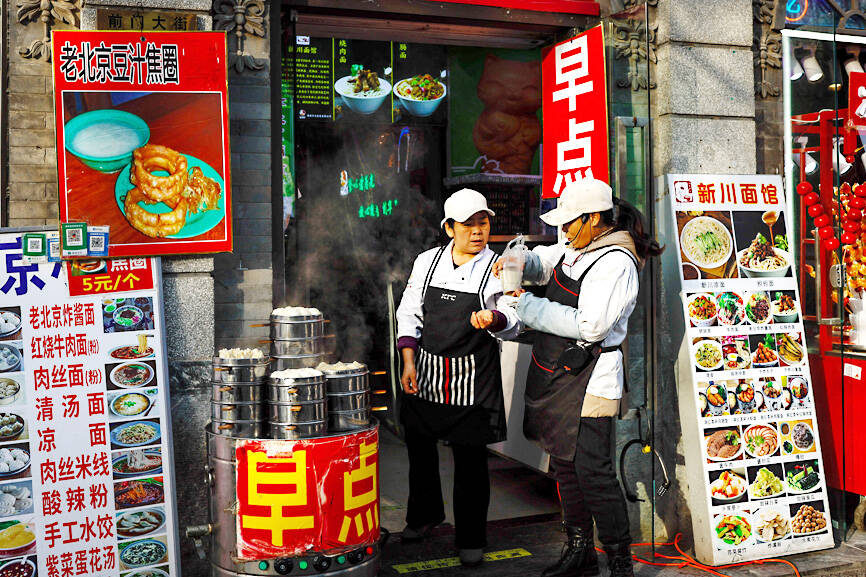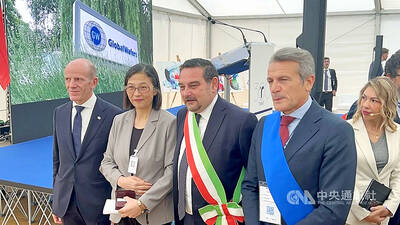Deflation in China accelerated last month, official data showed on Saturday, underlining the difficulties the world’s second-largest economy faces in reviving slowing demand.
The consumer price index (CPI), the main gauge of inflation, fell 0.5 percent year-on-year following a decline of 0.2 percent in October, China’s National Bureau of Statistics (NBS) data show.
NBS official Dong Lijuan (董莉娟) said in a statement that the decline was linked to “downward fluctuations in the prices of energy and food.”

Photo: EPA-EFE
The so-called core CPI, which strips out volatile food and energy costs, rose 0.6 percent last month, repeating the previous month’s performance.
While deflation suggests goods are cheaper, it poses a threat to the broader economy as consumers tend to postpone purchases in the hopes of further reductions.
A lack of demand could force companies to cut production, freeze hiring or lay off workers, while also having to discount existing stocks — dampening profitability even as costs remain the same.
The NBS also said the producer price index sank for the 14th consecutive month, sliding 3.0 percent year-on-year compared with 2.6 percent the previous month.
Dong attributed the decline to “a rebound in international oil prices which weakened demand for some industrial goods.”
China has struggled with falling prices much of this year, contrasting with many other parts of the world where central banks are focused on taming inflation instead.
Bloomberg Economics expects deflationary risks to persist into next year, as there are not enough catalysts to counter the housing slump, which has suppressed demand and prices.
Deflationary pressures have increased due to weak domestic demand, Pinpoint Asset Management Ltd (保銀私募基金管理) chief economist Zhang Zhiwei (張智威) said.
“This highlights the importance of more supportive fiscal policy,” Zhang added.
Additional reporting by Bloomberg

RECYCLE: Taiwan would aid manufacturers in refining rare earths from discarded appliances, which would fit the nation’s circular economy goals, minister Kung said Taiwan would work with the US and Japan on a proposed cooperation initiative in response to Beijing’s newly announced rare earth export curbs, Minister of Economic Affairs Kung Ming-hsin (龔明鑫) said yesterday. China last week announced new restrictions requiring companies to obtain export licenses if their products contain more than 0.1 percent of Chinese-origin rare earths by value. US Secretary of the Treasury Scott Bessent on Wednesday responded by saying that Beijing was “unreliable” in its rare earths exports, adding that the US would “neither be commanded, nor controlled” by China, several media outlets reported. Japanese Minister of Finance Katsunobu Kato yesterday also

‘DRAMATIC AND POSITIVE’: AI growth would be better than it previously forecast and would stay robust even if the Chinese market became inaccessible for customers, it said Taiwan Semiconductor Manufacturing Co (TSMC, 台積電) yesterday raised its full-year revenue growth outlook after posting record profit for last quarter, despite growing market concern about an artificial intelligence (AI) bubble. The company said it expects revenue to expand about 35 percent year-on-year, driven mainly by faster-than-expected demand for leading-edge chips for AI applications. The world’s biggest contract chipmaker in July projected that revenue this year would expand about 30 percent in US dollar terms. The company also slightly hiked its capital expenditure for this year to US$40 billion to US$42 billion, compared with US$38 billion to US$42 billion it set previously. “AI demand actually

Jensen Huang (黃仁勳), founder and CEO of US-based artificial intelligence chip designer Nvidia Corp and Taiwan Semiconductor Manufacturing Co (TSMC, 台積電) on Friday celebrated the first Nvidia Blackwell wafer produced on US soil. Huang visited TSMC’s advanced wafer fab in the US state of Arizona and joined the Taiwanese chipmaker’s executives to witness the efforts to “build the infrastructure that powers the world’s AI factories, right here in America,” Nvidia said in a statement. At the event, Huang joined Y.L. Wang (王英郎), vice president of operations at TSMC, in signing their names on the Blackwell wafer to

Taiwan-based GlobalWafers Co., the world’s third largest silicon wafer supplier, on Wednesday opened a 12-inch silicon wafer plant in Novara, northern Italy - the country’s most advanced silicon wafer facility to date. The new plant, coded “Fab300,” was launched by GlobalWafers’ Italian subsidiary MEMC Electronics Materials S.p.A at a ceremony attended by Taiwan’s representative to Italy Vincent Tsai (蔡允中), MEMC President Marco Sciamanna and Novara Mayor Alessandro Canelli. GlobalWafers Chairwoman Doris Hsu (徐秀蘭) said the investment marked a milestone in the company’s expansion in Europe, adding that the Novara plant will be powered entirely by renewable energy - a reflection of its